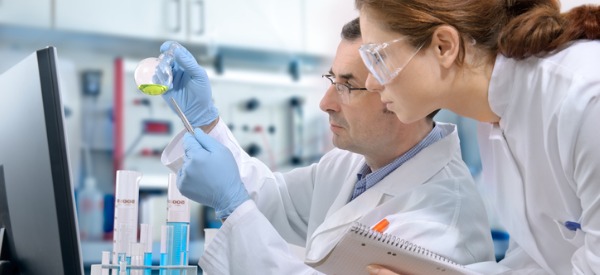What is a Medical Laboratory Technician?
A medical laboratory technician performs essential laboratory tests and analyses to aid in the diagnosis, treatment, and prevention of diseases. These technicians work under the supervision of medical laboratory technologists and other healthcare professionals, utilizing a variety of laboratory equipment and technologies to process and analyze patient samples, such as blood, urine, and tissues. Medical laboratory technicians work in hospitals, clinics, diagnostic laboratories, or research facilities, contributing to the timely and accurate delivery of crucial medical information that informs patient care decisions.
Get online training through our partner:
What does a Medical Laboratory Technician do?

Duties and Responsibilities
Medical laboratory technicians perform a variety of duties and responsibilities within clinical laboratory settings to support the diagnosis, treatment, and prevention of diseases. Here are their primary responsibilities:
- Sample Collection and Processing: Medical laboratory technicians collect patient specimens, such as blood, urine, tissue, and other bodily fluids, following established protocols for proper handling and labeling. They prepare specimens for analysis by centrifuging, aliquoting, and labeling them accurately to maintain sample integrity and traceability.
- Laboratory Testing: Medical laboratory technicians perform a wide range of routine laboratory tests using automated analyzers and manual techniques. These tests may include hematological, biochemical, microbiological, immunological, and molecular assays to detect abnormalities and disease markers in patient samples.
- Quality Control and Assurance: Medical laboratory technicians adhere to quality control and assurance procedures to ensure the accuracy, precision, and reliability of laboratory test results. They perform regular calibration, maintenance, and troubleshooting of laboratory equipment and instrumentation to maintain optimal performance.
- Data Entry and Record Keeping: Medical laboratory technicians record test results, observations, and other pertinent information accurately in laboratory information systems (LIS) or electronic medical records (EMR). They maintain detailed records of patient specimens, test requests, and laboratory procedures for documentation and traceability purposes.
- Communication and Collaboration: Medical laboratory technicians communicate effectively with healthcare providers, laboratory staff, and other members of the healthcare team to relay test results, discuss sample requirements, and resolve any issues or discrepancies. They collaborate with laboratory technologists, pathologists, and clinicians to interpret test results and provide timely and accurate information for patient care.
- Compliance and Safety: Medical laboratory technicians adhere to regulatory requirements, safety protocols, and infection control procedures to ensure a safe working environment for themselves and others. They follow standard precautions, wear appropriate personal protective equipment (PPE), and handle hazardous materials and biohazardous waste according to established guidelines.
- Continuing Education: Medical laboratory technicians participate in ongoing training, continuing education programs, and professional development activities to stay updated on new laboratory techniques, technologies, and best practices. They strive to enhance their knowledge and skills to provide high-quality laboratory services and contribute to the advancement of the profession.
What is the workplace of a Medical Laboratory Technician like?
Medical laboratory technicians can work in a variety of environments, including hospitals, clinics, physician offices, diagnostic laboratories, research institutions, and public health agencies. In hospitals and large medical centers, medical laboratory technicians typically work in clinical laboratories, which are equipped with state-of-the-art instrumentation and facilities to perform a wide range of laboratory tests and analyses.
Within the clinical laboratory, medical laboratory technicians work in well-organized and controlled environments designed to meet strict regulatory standards for quality, safety, and infection control. They may spend their days in laboratory settings, performing laboratory tests, operating laboratory equipment, and handling patient specimens. Medical laboratory technicians collaborate closely with other laboratory personnel, including medical laboratory technologists, pathologists, laboratory managers, and administrative staff, to ensure efficient workflow, accurate test results, and timely delivery of laboratory services.
The work of medical laboratory technicians requires attention to detail, precision, and adherence to established protocols and procedures to maintain the integrity and reliability of laboratory testing. They may work independently or as part of interdisciplinary healthcare teams, depending on the complexity of laboratory tests and the level of supervision required. They may also interact with healthcare providers, nurses, and other members of the healthcare team to discuss test results, interpret findings, and contribute to patient care decisions.
Frequently Asked Questions
Medical Laboratory Technician vs Medical Laboratory Technologist
The terms "Medical Laboratory Technician" and "Medical Laboratory Technologist" are often used interchangeably, but there are some differences between the two roles in terms of education, responsibilities, and scope of practice.
Education and Training:
- Medical Laboratory Technicians: Typically complete a one to two year Associate Degree or Certificate in Medical Laboratory Technology. MLT programs provide training in laboratory techniques, procedures, and instrumentation, along with clinical rotations in various laboratory departments.
- Medical Laboratory Technologists: Generally hold a Bachelor's Degree in Medical Laboratory Science, Clinical Laboratory Science, or a related field. MLT programs at the bachelor's level include coursework in biology, chemistry, microbiology, and laboratory science, as well as supervised clinical rotations.
Responsibilities and Scope of Practice:
- Medical Laboratory Technicians: Perform routine laboratory tests and analyses under the supervision of medical laboratory technologists or laboratory managers. Technicians may conduct basic laboratory procedures, operate laboratory equipment, maintain quality control measures, and document test results.
- Medical Laboratory Technologists: Have a broader scope of practice and may perform more complex laboratory tests and analyses independently. MLTs often work in specialized areas of the laboratory, such as clinical chemistry, hematology, microbiology, immunology, or molecular diagnostics, and may be responsible for interpreting test results, troubleshooting instrumentation, and supervising laboratory staff.
In summary, while both medical laboratory technicians and medical laboratory technologists play essential roles in clinical laboratory settings, medical laboratory technologists typically have more advanced education and training, as well as a broader scope of practice, compared to medical laboratory technicians.
Medical Laboratory Technicians are also known as:
Clinical Laboratory Technician
Laboratory Technician
Medical Lab Technician